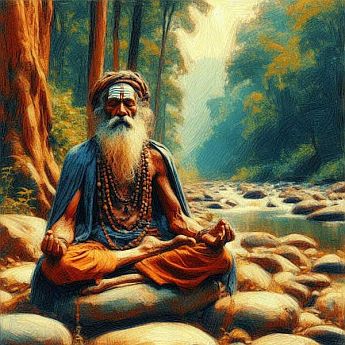|
 Sannyasi in padmasana (lotus pose)
Sannyasi in padmasana (lotus pose)
|
|
There is no need to compare any two (or more)
disciplines,
regardless of our intellectual pull to do it. So if I
were to make only one pragmatic, three-fold
comparison, I would differentiate inter alia the
following:
I ran
a successful
software training company
for about twenty years. Those were the days prior to PCs and the
internet. Even lowly computer businesses made a lot of
money. During that time, my business travels took me to two states
a week on average. I took it on not because of any love for
business or for software.
My raison d'etre for doing it was to generate enough
income to house my family, school my children, and create a
portfolio to finance my retirement. I was looking forward to
retirement, leisure, relaxing, and pursuing
spiritual
disciplines.
Of course, you can be
a spiritual
practitioner
no matter what else you do. That's actually the whole idea
about
spiritual practice.
And clearly, there would be enough time for such practice, once the
frenzy of business had subsided.
Werner's
ideas presented an entirely new
face,
a bold new
access
to what I'd deemed to be
the spiritual realm.
While I struggled with them at first, the more I struggled
with them, the more I got their simple, powerful obviousness which
resulted in many instances of me forgoing my own ideas in favor of
his, simply because when I tried on his in favor of my own, his
worked better. It was that simple. Finally, when my
long-awaited retirement came due, my inquiry into
spiritual practice
was on the back-burner. It wasn't that its compelling attraction
had worn thin. It was that
Werner
appeared to be living in
a spiritual realm
that didn't require practice, one that had
recontextualized
(I love that word)
enlightenment.
Whatever it was he was offering, I wanted it.
|
